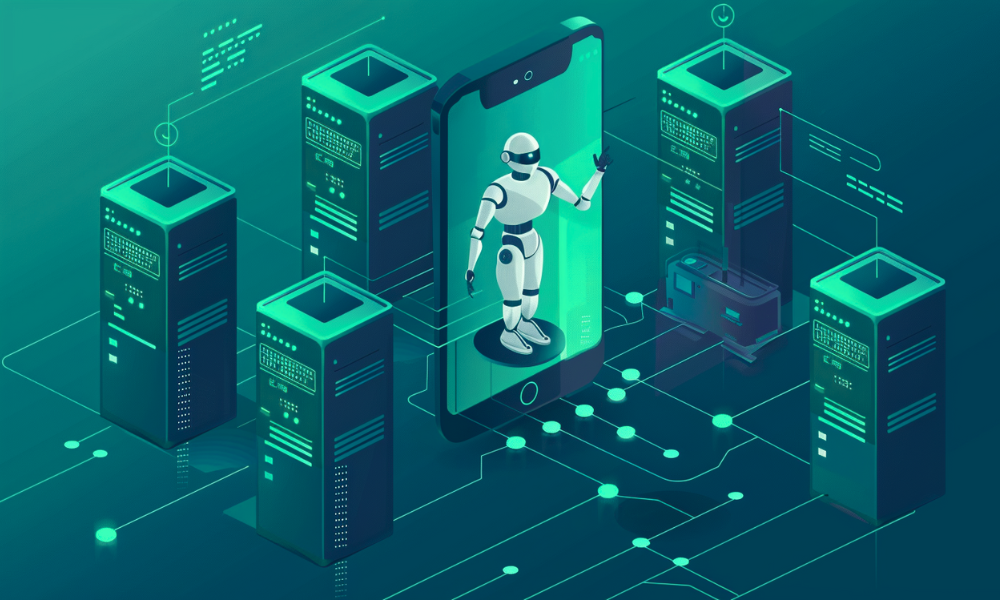As mobile apps continue to dominate our digital experiences, ensuring their reliability and performance through comprehensive testing is paramount. However, this can be difficult in the fast-paced world of mobile app development, where you must balance rapid releases with a bug-free and optimal user experience.
A crucial part of ensuring your app functions as intended is through diverse test data. Traditionally, producing and maintaining test data has been a manual, meticulous, and often labor-intensive process.
Enter generative artificial intelligence (AI), a transformative solution that offers a quicker and more efficient way to generate test data. This post will explore how AI generates test data, the benefits and limitations of using AI to generate data, some real-world examples, and popular AI-powered data generation tools.
What is Test Data Generation?

Test data generation involves creating data sets that mimic real-world scenarios to validate applications’ functionality and performance. In mobile app development, this means creating data that simulates user interactions, network conditions, device diversity, and more, providing a thorough ground for testing.
Why is Test Data Generation Important?
Test data represents the inputs and conditions used to validate your app’s functionality, performance, and security. Generating and using test data is key for data-driven testing, and using diverse and relevant test data is critical for assessing an app’s performance under different user behaviors.
Test data generation allows developers and testers to:
- Identify bugs and issues before public release.
- Ensure the app meets its functional requirements.
- Validate the app’s performance under various conditions.
- Improve user satisfaction and reduce post-release fixes.
What is Generative AI?
Generative AI refers to the subset of artificial intelligence technologies that can generate new content or data. Unlike traditional AI models that make predictions or classifications based on input data, generative AI can create new text, images, sounds, and more that were not present in its training data.
Generative AI can streamline and enhance your test data generation by:
- Learning from existing data.
- Creating varied and extensive data sets by generating new data points.
- Automating data generation.
- Adapting its data generation as your app evolves and new features are added.
How Can I Use AI to Generate Test Data?

AI can automate and enhance the generation of test data for mobile apps in several ways:
- Data Diversity: Create diverse and comprehensive datasets that cover a wide range of scenarios, user behaviors, and input variations, more than a human could feasibly conceive.
- Realistic Data: By learning from real-world user data, AI can generate test data that closely mimics actual user behavior and scenarios, providing a more accurate testing ground.
- Edge Cases and Scenarios: AI can be programmed to focus on edge cases or rare scenarios that are difficult to capture with real-world data alone.
- Data Privacy: AI can create anonymized data sets that retain the essential characteristics of the original data without including any sensitive or personally identifiable information.
Challenges and Considerations
While AI offers significant advantages, there are limitations:
- Data Privacy and Security: AI requires access to real data, including sensitive or confidential information. To help protect your user’s private data, implement access controls and encryption during the data generation process.
- Accuracy and Generalization: Using AI models that produce realistic and non-biased datasets is crucial. To prevent this issue, continuously train your AI model by using diverse data sources, then test the generated test data to identify any issues.
- Maintenance and Upkeep: AI models require maintenance and updates; otherwise, the quality of generated test data will decline over time. Stay informed about AI advancements and establish a maintenance schedule to reduce this risk.
- Complexity: Implementing AI for test data generation can be complex and requires expertise in both AI and testing.
Real-World Examples for Generating Data Using AI
The use of AI to generate test data has been increasingly adopted across various industries to enhance the quality and efficiency of mobile app testing. Here are some real-world examples illustrating how AI-generated test data can be used:
E-Commerce
Scenario: You have an e-commerce app that you want to test under various load conditions and transaction types.
Generative AI can create numerous user profiles, complete with browsing habits, purchase history, cart preferences, and more. This data helps simulate different user behaviors and interactions with the app.
For example, AI can generate data for users who browse without making purchases, users who add items to the cart and abandon them, and users who make frequent purchases. By testing these scenarios, the company can identify potential bottlenecks or issues that could affect user experience.
Healthcare
Scenario: You’re releasing a healthcare app and you want to ensure it handles patient data accurately while maintaining privacy and adhering to HIPAA guidelines.
AI can generate synthetic patient records that are realistic yet do not correspond to any real individuals, maintaining privacy and compliance. This data can include patient demographics, medical histories, treatment plans, and more.
Financial/Banking
Scenario: You have a banking app and you need to ensure secure and efficient handling of various financial transactions and user interactions under different conditions.
Generative AI models can create realistic financial data, including account details, transaction histories, loan applications, and investment profiles. This synthetic data enables testers to simulate a wide range of banking scenarios, such as high-volume transaction processing, fraud detection, and personalized banking experiences.
Mobile Games
Scenario: You have a mobile game and you want to test its gameplay, user interaction, and performance under various conditions.
AI can generate player behaviors and interactions, creating diverse gameplay scenarios to test the game’s mechanics and story progression. It can also generate synthetic player data, simulate high-traffic conditions, and more.
AI-Driven Test Data Generation Tools
Several tools and frameworks are available to facilitate AI-driven test data generation. Reliable test data generation tools should offer diverse data, automation, customization, and more.
Here are some popular tools (in no certain order):
- Datprof: Offers tools for test data management and anonymization, providing solutions that help maintain data integrity and relevance while ensuring privacy and compliance with data protection regulations.
- EMS Data Generator: Allows users to generate large volumes of test data for various database types, offering a quick and practical solution to create data for testing database applications and ensuring their performance and scalability.
- Mostly AI: Specializes in generating synthetic data that mirrors real-world data’s statistical properties, enabling businesses to leverage AI models for simulations, testing, and data privacy without using actual sensitive information.
- Keras: While primarily a deep learning API, Keras enables the creation and training of AI models that can be used for generating synthetic data or augmenting existing data sets, contributing to more robust machine learning applications.
- Mockaroo: A versatile tool that allows users to create customizable and realistic datasets for testing and development purposes, offering a simple interface to specify data types, formats, and quantities.
- DTM Data Generator: Provides businesses with the capability to produce realistic database test data, supporting a variety of database systems, and allows for customization to ensure the data meets specific testing needs.
- GenerateData: An open-source, web-based tool that allows users to quickly create large volumes of custom data in various formats (like CSV, Excel, HTML, SQL, and more) for use in testing databases, applications, or any other data-driven scenario.
Level Up Your Test Data Generation with AI
Integrating AI into test data generation can significantly enhance the testing process for mobile apps, leading to more robust, reliable, and user-friendly applications. While there are challenges and limitations, the potential benefits make AI an invaluable tool in the app developer’s and tester’s arsenal. As AI technology evolves, we can anticipate even more sophisticated and effective testing methodologies emerging in the mobile app development space.









